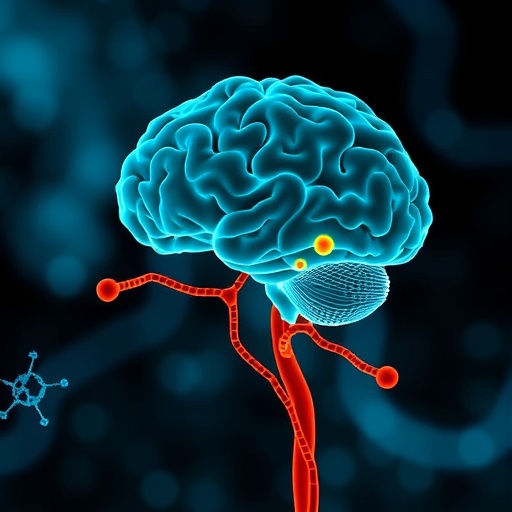In the realm of neuroscience, understanding the biological underpinnings of mental health disorders is undergoing a transformative shift, with a particular emphasis on the role of biological sex. Women experience severe depression at twice the rate of men, a disparity that has remained partly mysterious. Emerging research now suggests that sex-specific variations in the blood-brain barrier (BBB) may hold critical clues to this phenomenon. The BBB, a selective border formed by astrocytes and endothelial cells, serves as a vital checkpoint maintaining brain homeostasis. When compromised or ‘leaky,’ it can precipitate a cascade of neurological dysfunctions, including depressive disorders. This groundbreaking investigation into sex differences in BBB function, spearheaded by Kerstin Lenk at TU Graz in collaboration with the University of Regensburg, is ushering in new vistas for understanding and treating depression.
Defining the BBB’s role in neurological health has long been a scientific pursuit, but the focus on gender-specific aspects is relatively novel. Astrocytes—highly branched glial cells—and endothelial cells lining the cerebral vasculature constitute this barrier, dynamically regulating the passage of molecules and signaling entities between the bloodstream and brain tissue. Lenk’s team hypothesizes that alterations in the interaction between these cell types may contribute differentially to depressive pathophysiology in women versus men. This hypothesis forms the cornerstone of their project, “Leaky blood-brain barrier in major depressive disorder,” supported by the Austrian Science Fund FWF and the German Research Foundation.
At the core of this investigation are sophisticated in vitro experiments utilizing cultured human cells. These cellular models mimic the healthy and diseased states of the brain’s BBB, enabling researchers to dissect the intricate communication channels between astrocytes and endothelial cells. Employing biomolecular assays, biochemical analyses, and pharmacogenetic tools, the team identifies molecular signatures and pathways unique to each cell type that may drive depressive symptoms. This layered experimental approach allows a granular understanding of how BBB integrity and cell signaling vary with sex and disease state, a leap forward from previous research paradigms that often overlooked these critical distinctions.
Crucially, Lenk’s group is pioneering the integration of empirical data with advanced computational models, creating digital twins of astrocytes, endothelial cells, and the BBB as an entire system. These in silico replicas enable high-resolution simulations of messenger molecule diffusion and intercellular interactions, offering novel insights unattainable through conventional wet-lab techniques alone. This synergy between experimental biology and computational neuroscience exemplifies the next frontier in neuropsychiatric research, where multidisciplinary tools converge to unravel complex brain mechanisms underlying depression.
Artificial intelligence (AI) further amplifies this research’s potential by mining expansive datasets to detect patterns indicative of sex-specific BBB dysregulation. Machine learning algorithms analyze variations in cell behavior and molecular exchanges, illuminating differences that might elude traditional statistical methods. By uncovering these patterns, AI supports hypothesis generation and validation, hastening the discovery of mechanistic pathways distinct between men and women. This marriage of experimental and computational innovation holds promise not only for decoding depressive disorders but also for pioneering personalized treatment strategies.
Lenk articulates the broader objective of their research ecosystem: to bridge critical knowledge gaps about why depression manifests and responds differently across sexes. Recognizing the BBB’s sex-specific functional nuances could revolutionize clinical approaches, guiding the design of targeted pharmacotherapies that consider gender as a pivotal factor. This paradigm shift towards sex-informed medicine reflects a commitment to precision psychiatry, potentially improving outcomes for millions affected by depression globally.
The emphasis on biological sex differences resonates with an expanding movement in neuroscience, which calls for a conscious integration of gender in experimental design and interpretation. Their recent contribution to Nature Reviews Bioengineering elaborates on the utility of in vitro systems—such as induced pluripotent stem cells, 3D brain organoids, and organ-on-a-chip platforms—that mimic human neurological tissues with unprecedented fidelity. These models enable scientists to probe sex-specific cellular functions and disease mechanisms under controlled conditions, bridging the translational divide between lab discoveries and clinical application.
Furthermore, the coupling of these organotypic cultures with computational simulations and AI represents a transformative methodological advancement. By complementing physical models with virtual and algorithmic analyses, researchers gain multi-dimensional perspectives, enabling the exploration of complex biological systems at scales ranging from molecular interactions to cellular networks. This holistic approach promises to enhance reproducibility and predictive power within neurobiological research, catalyzing discoveries that are more reflective of human physiology’s intricacies.
Lenk’s leadership in this domain underscores the critical importance of multidisciplinary collaboration, combining expertise in neural engineering, experimental neuroscience, computational modeling, and artificial intelligence. Together with her colleagues at the University of Regensburg, this integrated strategy exemplifies how cross-institutional partnerships can accelerate progress in understanding neurological disorders, particularly those with elusive multifactorial origins like depression.
Ultimately, this research trajectory aims not only to unravel the biological nuances of sex differences in brain disorders but also to inspire new therapeutic frontiers. By dissecting the detailed mechanisms underpinning BBB dysfunction in depression and illuminating how these mechanisms diverge between men and women, the scientific community moves closer to developing gender-responsive interventions. Such advancements hold transformative potential for mental health care worldwide, where depression remains a leading cause of disability and mortality.
As this pioneering work advances, it exemplifies the growing recognition within biomedical sciences that sex and gender are not mere variables but fundamental biological dimensions that shape disease onset, progression, and treatment response. The integration of modern experimental systems, AI, and computational models offers an unprecedented toolkit to decipher these dimensions, setting the stage for a new era in neuroscience—one that embraces complexity and champions individualized, sex-informed care.
Subject of Research: Cells
Article Title: Modelling sex differences of neurological disorders in vitro
News Publication Date: Not provided
Web References: http://dx.doi.org/10.1038/s44222-025-00355-w
References: Lenk K, et al. Modelling sex differences of neurological disorders in vitro. Nature Reviews Bioengineering. Published 13-Oct-2025. DOI: 10.1038/s44222-025-00355-w
Image Credits: Fotogenia
Keywords: blood-brain barrier, depression, sex differences, astrocytes, endothelial cells, digital twins, artificial intelligence, computational neuroscience, in vitro models, neuropsychiatry, sex-informed medicine, organoids




